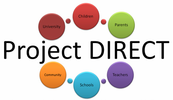This semester, I was asked to work one-on-one with a student in the class who’s been exhibiting some problem behaviors. At first, it was a little difficult working with this student since some of their problem behaviors can be very extreme and too much for two teachers to handle, let alone one student volunteer such as myself. Although it was a challenge, I think that this student has shown some improvement over the past couple of weeks. By working with this student one-on-one, I’ve learned more about his likes and dislikes which allows me to know how to help improve this student’s behavior. Some improvements include him playing with other students more, not running out of the classroom, and being more of an active participant in class. I am very proud of the improvements that this student has made and hope that he continues to do well in the future.
Since my last day at the preschool will be next week, I’m starting to get very sad. I am really going to miss walking into class every Friday morning and seeing all of their smiling faces. I wish for nothing but the best not only for the students but for the teachers as well!

 RSS Feed
RSS Feed